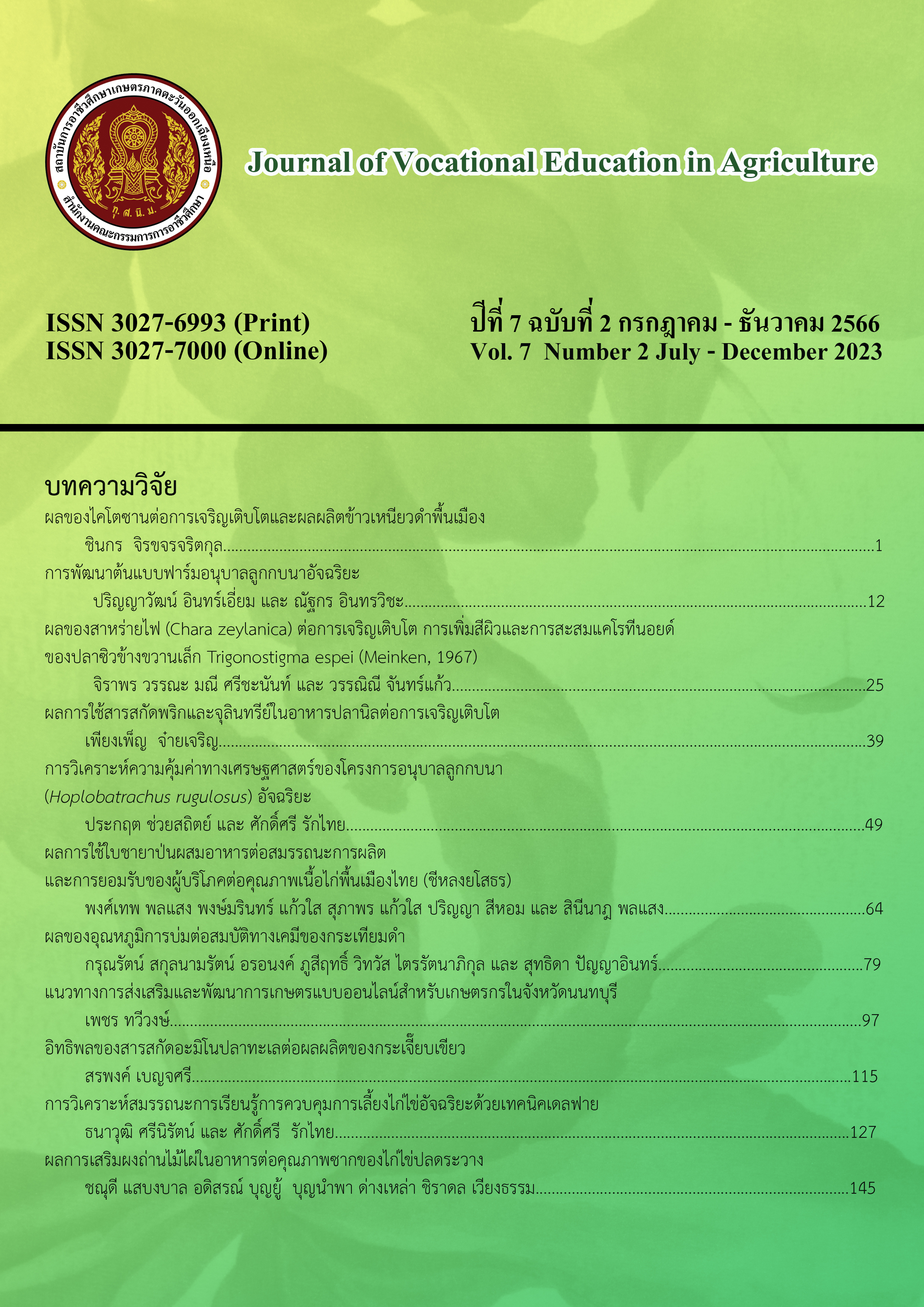Effects of Chitosan on Growth and Yield of Native Black Glutinous Rice
Main Article Content
Abstract
Rice is an economic crop that must be developed all the time. and to find ways to increase productivity along with improving quality Especially in the process of increasing productivity. Chitosan is a biological substance that has the properties to stimulate growth and increase plant productivity. This experiment aimed to test the concentration of chitosan that affects the growth and yield of native black glutinous rice in Phu Po Sub-district, Muang District, Kalasin Province. By planning a completely randomized design, the experiment was divided into 4 experiments with 4 replications comparing the use of chitosan at concentrations of 0 ppm (control), 1 ppm, 2 ppm, and 3 ppm. Such assigned concentrations of chitosan would be sprayed 3 times on day 40, day 50, and day 60 after planting. The height of each plant, the number of plants per clump, the number of ears per clump, the number of seeds per spike, seed weight per spike, and total seed weight were measured and compared the values between the experimental groups. By experimenting in a hydroponic greenhouse. Department of Agriculture Chandrakasem Rajabhat University Between August and December 2022, a total of 120 days. The experiment found that Native black glutinous rice when sprayed with 2 ppm chitosan concentration resulted in native black glutinous rice plant height. number of trees per clump The highest number of ears per clump. And indigenous black glutinous rice when sprayed with chitosan at a concentration of 3 ppm resulted in the number of seeds per ear of native black glutinous rice. seed weight per ear and total seed weight increased Statistically significant (P<0.05). Compared to the control group that was not sprayed with chitosan, therefore, the use of chitosan at different concentrations at different periods affected growth. stimulation of flowering and especially used during the flowering period will result in the weight and quality of native black glutinous rice grains
Article Details

This work is licensed under a Creative Commons Attribution-NonCommercial-NoDerivatives 4.0 International License.
The content and information in articles published in the Journal of Vocational Education in Agriculture are the opinions and responsibility of the article's author. The journal editors do not need to agree or share any responsibility.
Articles, information, content, etc. that are published in the Journal of Vocational Education in Agriculture are copyrighted by the Journal of Vocational Education in Agriculture. If any person or organization wishes to publish all or any part of it or to do anything. Only prior written permission from the Journal of Vocational Education in Agriculture is required.
References
Karladee, D., et al. (2000). Genetics, breeding and agriculture nutritional immunity of purple rice (Oryza sativa L.) (Research reports). Chiang Mai: Science and Technology Research Institute, Chiang Mai University. (in Thai)
Kim, C., et al. (2010). Computational identification of seed-specific transcription factors involved in anthocyanin production in black rice. BioChip Journal, 4, 247–255.
Naivikul, O. (2007). Rice: Science and Technology. 2nd ed. Bangkok: Kasetsart University. (in Thai)
Phengrat, J. & Jearakongman, S. (2010). Black glutinous rice: Various benefits, composite thinking, enhancing Thai economic opportunities. Thai Rice Research Journal, 4(2), 73-82. (in Thai)
Gregorio, G. B. (2002). Progress in breeding for trace minerals in staple crops. The Journal of Nutrition, 132(3), 500S–502S.
Kongthong, S. (2009). Chitin-Chitosan. Journal of Industrial Education, 3(1), 1-7. (in Thai)
Boonlertnirun, S., et al. (2008). Application of chitosan in rice production. Journal of Metals, Materials and Minerals, 18(2), 47-52.
Thobunluepop, P., et al. (2008). The perspective effects of various seed coating substances on rice seed variety Khao Dawk Mali 105 storability I: The case study of physiological properties. Pakistan Journal of Biological Sciences, 11(19), 2291-2299.
Farouk, S., et al. (2008). Induction and expression of systematic resistance to downy mildew disease in cucumber plant by elicitors. Egyptian Journal of Phytopathology, 36(1-2), 95-111.
Ghoname, A. A., et al. (2010). Enhancement of sweet pepper crop growth and Production by application of biological, organic and nutritional solutions. Research Journal of Agriculture and Biological Science, 6(3), 349-355.
Sheikha, S. A. & Al-Malki, F. M. (2011). Growth and chlorophyll responses of bean plants to chitosan applications. European Journal of Scientific Research, 50, 124-134.
Hayimali, S. & Mamurae, S. (2019). Effects of chitosan on the growth of native rice. (Special problem). Yala: Yala Rajabhat University. (in Thai)
Poonsin, T. (2013). Effect of Oligochitosan on Growth and Self Defense Mechanism of Sung Yod Phatthalung Rice. ASEAN Journal of Scientific and Technological Reports, 16(3), 21-28. (in Thai)
Boonlertnirun, S. (2018). Effect of Chitosan on Yield of Rice Plants Subjected to High Temperature at Different Growth Stages. King Mongkut’s Agricultural Journal, 36(2). 73-84. (in Thai)
Tanwan, N., et al. (2017). The effect of chitosan on enhanced yield and secondary metabolite compounds in rice. KHON KAEN AGRICULTURE JOURNAL, 45(Suppl.1), 1322-1327. (in Thai)
Ohta, K., et al. (2001). Effect of chitosan treatments on seedling growth, chitinase activity and flower quality in Eustoma grandiflorum (raf) Shinn. “Kairyou Wakamurasaki”. The Journal of Horticultural Science and Biotechnology, 76(5), 612-614.
Chibu, H., et al. (1999). Effect of Chitosan Application on the Growth of Raddish Seedling. Japanese Journal of Crop Science, 68(2), 199-205.
Boonlertnirun, S., et al. (2012). Agronomic Characteristic and Physiological Responses of Rice (Oryza sativa L.) after Chitosan Application under Drought Stress Condition (Research reports). Phranakhon Si Ayutthaya: Rajamangala University of Technology Suvarnabhumi. (in Thai)
Lu, J., et al. (2002). The Biological Effects of Chitosan on Rice Growth. Journal Acta Agriculture Shanghai. 18(4). 31-34.
Wattanakorn, K. & Rungcharoenthong, P. (2016). Effect of chitosan on yield in Hom-nin rice two seasons. KHON KAEN AGRICULTURE JOURNAL, 44(Suppl.1), 290-294. (in Thai)
Khamlue, M. (2015). Effects of chitosan on the growth and yield of Chainat 1 and Sakon Nakhon rice in conditions of lack of water. (Special problem). Mahasarakham: Mahasarakham University. (in Thai)

